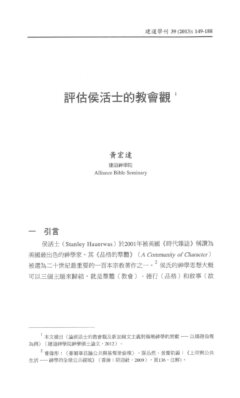評估侯活士的教會觀/黃宏達
撮要
本文是對侯活士的教會論評估,並借助新加爾文主義的普遍恩典觀和教會論。本文指出侯氏的盲點有四,分別是把教會代替了聖經;混淆了特殊恩典與普遍恩典;忽略「教會作為有機體」的向度及無法發展一種能支持改變社會和有關策略的神學。另一方面,本文亦指出侯氏的教會論的特色是結合了成聖論,所以,教會倫理就是個人倫理。教會因而是個別信徒的群體性倫理資源。因此,侯氏的貢獻有二,分別是教會的群體屬靈智慧和經驗可以在複雜多變的倫理處境進程中指導信徒如何應用聖經的絕對原則,第二就是教會應該像支援宣教士一般受倫理困擾的信徒。
ABSTRACT
This paper is an evaluation of ecclesiology of Stanley Hauerwas with the help of the concept of common grace and ecclesiology of Neo-Calvinism. This paper points out the four blind spots of Hauerwas. They are replacing the Bible with church; failure of distinguishing between special grace and common grace;neglecting the dimension of “church as organism”; and failure of developing a theology of changing society and related strategy. On the other hand, this paper also points out that Hauerwas’s ecclesiology is characterized by it’s combination with sanctification. Then, church ethics is personal ethics. Church is communal ethical resources for individual Christian. Therefore, there are two contributions. First, the communal spiritual wisdom and experience of church can be a guidance of application of absolute biblical principles in a complicated and changing ethical situation for individual Christian. Second, church should support the Christian facing ethical struggle in the way supporting a missionary.
原載於《建道學刊》39期(2013年1月),頁149-188。







